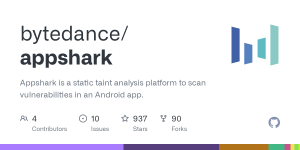
Document Index
-
You must be registered for see links
-
You must be registered for see links
-
You must be registered for see links
-
You must be registered for see links
-
You must be registered for see links
-
You must be registered for see links
-
You must be registered for see links
-
You must be registered for see links
-
You must be registered for see links
AppShark
Appshark is a static taint analysis platform to scan vulnerabilities in an Android app.Prerequisites
Appshark requires a specific version of JDK –
You must be registered for see links
. After testing, it does not work on other LTS versions, JDK 8 and JDK 16, due to the dependency compatibility issue.Building/Compiling AppShark
We assume that you are working in the root directory of the project repo. You can build the whole project with the
You must be registered for see links
tool.$ ./gradlew build -x test
After executing the above command, you will see an artifact file AppShark-0.1.1-all.jar in the directory build/libs.
Running AppShark
Like the previous step, we assume that you are still in the root folder of the project. You can run the tool with$ java -jar build/libs/AppShark-0.1.1-all.jar config/config.json5
The config.json5 has the following configuration contents.
{ “apkPath”: “/Users/apks/app1.apk”, “out”: “out”, “rules”: “unZipSlip.json”, “maxPointerAnalyzeTime”: 600 }
Each JSON field is explained below.
- apkPath: the path of the apk file to analyze
- out: the path of the output directory
- rules: the path(s) of the rule file(s), can be more than 1 rules
- maxPointerAnalyzeTime: the timeout duration in seconds set for the analysis started from an entry point
- debugRule: specify the rule name that enables logging for debugging
Interpreting the Results
Below is an example of the results.json.{ “AppInfo”: { “AppName”: “test”, “PackageName”: “net.bytedance.security.app”, “min_sdk”: 17, “target_sdk”: 28, “versionCode”: 1000, “versionName”: “1.0.0” }, “SecurityInfo”: { “FileRisk”: { “unZipSlip”: { “category”: “FileRisk”, “detail”: “”, “model”: “2”, “name”: “unZipSlip”, “possibility”: “4”, “vulners”: [ { “details”: { “position”: “<net.bytedance.security.app.pathfinder.testdata.ZipSlip: void UnZipFolderFix1(java.lang.String,java.lang.String)>”, “Sink”: “<net.bytedance.security.app.pathfinder.testdata.ZipSlip: void UnZipFolderFix1(java.lang.String,java.lang.String)>->$r31”, “entryMethod”: “<net.bytedance.security.app.pathfinder.testdata.ZipSlip: void f()>”, “Source”: “<net.bytedance.security.app.pathfinder.testdata.ZipSlip: void UnZipFolderFix1(java.lang.String,java.lang.String)>->$r3”, “url”: “/Volumes/dev/zijie/appshark-opensource/out/vuln/1-unZipSlip.html”, “target”: [ “<net.bytedance.security.app.pathfinder.testdata.ZipSlip: void UnZipFolderFix1(java.lang.String,java.lang.String)>->$r3”, “pf{obj{<net.bytedance.security.app.pathfinder.testdata.ZipSlip: void UnZipFolderFix1(java.lang.String,java.lang.String)>:35=>java.lang.StringBuilder}(unknown)->@data}”, “<net.bytedance.security.app.pathfinder.testdata.ZipSlip: void UnZipFolderFix1(java.lang.String,java.lang.String)>->$r11”, “<net.bytedance.security.app.pathfinder.testdata.ZipSlip: void UnZipFolderFix1(java.lang.String,java.lang.String)>->$r31” ] }, “hash”: “ec57a2a3190677ffe78a0c8aaf58ba5aee4d2247”, “possibility”: “4” }, { “details”: { “position”: “<net.bytedance.security.app.pathfinder.testdata.ZipSlip: void UnZipFolder(java.lang.String,java.lang.String)>”, “Sink”: “<net.bytedance.security.app.pathfinder.testdata.ZipSlip: void UnZipFolder(java.lang.String,java.lang.String)>->$r34”, “entryMethod”: “<net.bytedance.security.app.pathfinder.testdata.ZipSlip: void f()>”, “Source”: “<net.bytedance.security.app.pathfinder.testdata.ZipSlip: void UnZipFolder(java.lang.String,java.lang.String)>->$r3”, “url”: “/Volumes/dev/zijie/appshark-opensource/out/vuln/2-unZipSlip.html”, “target”: [ “<net.bytedance.security.app.pathfinder.testdata.ZipSlip: void UnZipFolder(java.lang.String,java.lang.String)>->$r3”, “pf{obj{<net.bytedance.security.app.pathfinder.testdata.ZipSlip: void UnZipFolder(java.lang.String,java.lang.String)>:33=>java.lang.StringBuilder}(unknown)->@data}”, “<net.bytedance.security.app.pathfinder.testdata.ZipSlip: void UnZipFolder(java.lang.String,java.lang.String)>->$r14”, “<net.bytedance.security.app.pathfinder.testdata.ZipSlip: void UnZipFolder(java.lang.String,java.lang.String)>->$r34” ] }, “hash”: “26c6d6ee704c59949cfef78350a1d9aef04c29ad”, “possibility”: “4” } ], “wiki”: “”, “deobfApk”: “/Volumes/dev/zijie/appshark-opensource/app.apk” } } }, “DeepLinkInfo”: { }, “HTTP_API”: , “JsBridgeInfo”: , “BasicInfo”: { “ComponentsInfo”: { }, “JSNativeInterface”: }, “UsePermissions”: , “DefinePermissions”: { }, “Profile”: “/Volumes/dev/zijie/appshark-opensource/out/vuln/3-profiler.json” }
License
AppShark is licensed under the
You must be registered for see links
GitHub:
You must be registered for see images
You must be registered for see links



